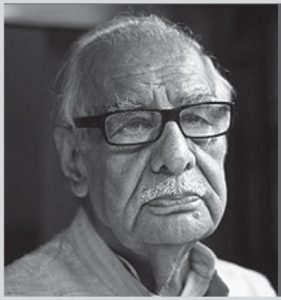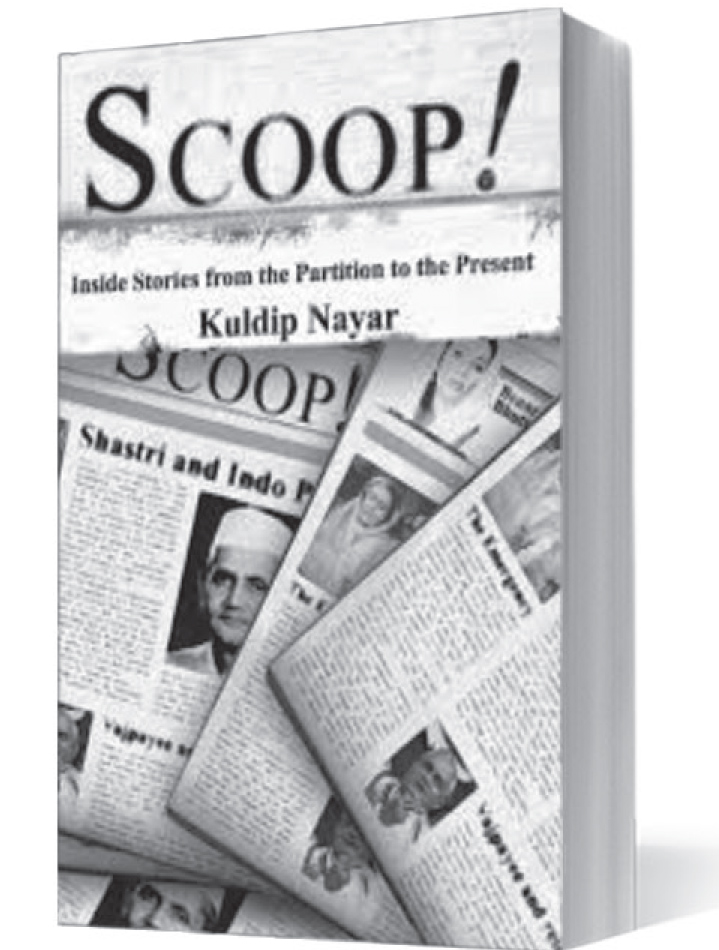Scoop-
Inside stories from the Partitions
to the Present
Kuldip Nayar
Harper Collins Publishers India
Pages 214-Price Rs.295
‘Scoop – inside stories from the Partitions to the Present’ by veteran journalist Kuldip Nayar gives interesting insights into the happenings of post – Independence India, tracing its chequered history, its rise and fall, mostly fall, till the end of the heinous Emergency of the Indira Days. These articles, Nayar says ‘may be scoops but they are also an insight into important events – how they happened and why’. They bear testimony to Nayar’s doggedness in chasing the news, his firm faith in human rights, his readiness to put the people on the right path and his courage of conviction.
He starts with ‘Gandhi’s death’ which he covered as a young journalist attached to a nondescript Urdu daily. He says the incident made him stay in journalism and continue to disseminate lofty values, which he continued to do in an exemplary fashion by moving to positions from where he could reach large audience.
The interesting meeting he had with Lord Mountbatten in London in 1971, gave him a lot of information. He describes how the British Prime Minister, Lord Clement Atlee wanted to keep India united, and how he tried his best to do so. Whoever may be blamed after such a gap of time, the fact remained that the Muslims at that time were extremely perturbed about their future. After going into the travails of partition and the mad fury, the hatred and the destruction, he concludes that ‘the climate in the sub-continent was one of hate and revenge,’ which, alas, has continued through the next century also.
The article ‘The Status of Hindi,’ gives elaborate details of the assurances, the discussions, the demands, the fears, the assertions, the talk and the doubletalk, and the hide and seek which went on while trying to come to a decision on the language muddle from 1948 to 1966.
While tracing the behind the door diplomacy engaged in for selecting a successor to Nehru, he narrates how an innocuous scoop he published resulted in alienating Moraji and endearing Sastri to the members of parliament. It made Nayar an enemy of Moraji and won him Sastri’s trust.
Giving a detailed account of the 1965 war with Pakistan, Kuldip Nayar assesses that it was “at best a 60 per cent victory of New Delhi if not a draw.” It was subsequently learnt that Ayub Khan was planning to start a war in one sector and simultaneously send infiltrators to the Kashmir sector. The British Prime Minister spoke to Sastri and Ayub Khan and made them stop hostilities for the time being. New Delhi was disappointed that Russia had taken a neutral position, though it assured full support for Kashmir.
Pakistan did send infiltrators into Kashmir, but was sorely disappointed that there was no uprising of people in Kashmir as it expected. They were very much upset. Ayub Khan openly displayed his contempt for Kashmiris. Lal Bahadur Sastri had no choice but to attack Pakistan to relieve pressure in Kashmir. What would Nehru have done under the same condition? Nayar says it is difficult to answer the question. But he records what the army general said about Sastri. He had said that the army could never forget ‘this tallest decision by the shortest man.’
The article ‘Inquiries and Disclosures’ goes into the question of honesty and integrity of politicians in office. Jawaharlal Nehru made his minister for petroleum resign from cabinet as he could not account for the contribution he had received from a businessman for election funds. Again Nehru had to bow to the pressure mounted in parliament against his favourite, Punjab Chief Minister Pratab Singh Kairon, and appoint a commission to look into allegations against him.
Nayar reveals a real scoop at one instance when he says that once Indira Gandhi thought she might be crowded out of Sastri’s cabinet under pressure and thought of settling down in UK. He gives a detailed account of the happenings at Tashkent where a treaty was signed by Lal Bhadur Sastri and Ayub Khan.
In spite of a lot of misgivings and misunderstandings, a treaty was signed wherein Sastri agreed that India would withdraw from all the territories occupied in the war, giving in to arm twisting by Kosysin. A move which even Sastri’s daughter and wife did not approve of. A graphic account of how Sastri met with his sudden death at Tashkent follows. Nayar says that Ayub Khan’s grief was genuine.
An article on “The Taming of the Judiciary” says how Indira Gandhi tried to influence the judiciary by speaking of commitment on the part of judges. The fact was she wanted judges who would toe the line of the government. When the time for the appointment of the Chief Justice of India came, three judges were superseded and A N Ray who came fourth in seniority was selected despite oppositions. Indira Gandhi had her way, as she always did.
Once Indira Gandhi had fixed a two-day cabinet meeting without presence of officials, since she did not want army leakage of the discussion. But, with his unusual acumen, Kuldip Nayar was able to collect all the information from the ministers after the first day’s meeting. Mrs. Gandhi was so frustrated the next day that she told her colleagues that it looked as if Kuldip Nayar himself had been attending the previous day’s meeting.

Kuldeep Nayyar, a rationalist who passed away in August 2018 had a distinguished career as a journalist worth his salt, standing his ground firmly against the wrath of the power that be. He served as press information officer to two Home Ministers, Gobind Ballabh Pant and Lal Bahadur Sastri besides holding important positions in several news agencies and newspaper offices. He has authored several books which throw light on Contemporary history, including his autobiography, The Day Looks Old.
After Sastri’s death, once again there was a tussle in choosing a successor. When a senior Congress leader suggested to Kamaraj to put himself up a candidate, Kamaraj, the two time kingmaker, admonished him since he knew has own limitation. When Kamaraj got ready to offer his support to Indira Gandhi, S. Nijalingappa and SK Patil warned him that she might one day turn against him, but he laughed it off. But later he regretted the choice till the end of his life.
Despite his proximity to Indira Gandhi, Nayar was incarcerated during the emergency, for he had been criticizing the emergency excesses in the guise of writing about affairs in other countries. By arresting a senior journalist, the establishment thought of instilling fear in the minds of journalists.
He came to know that the Emergency was going to be lifted and election announced, through a stray remark by someone in the establishment. As usual, he got it confirmed through conversation with an associate of Indira Gandhi and published it in “The Indian Express”.
He gives a detailed account of the court hearing regarding the use, or misuses of the Maintenance of Internal Security Act (MISA), and the judgment delivered by Justice Khanna against the misuse of power to curtail personal liberty, since the judge was convinced that the detentions during the Emergency were whimsical and motivated. He lost the chance of becoming the Chief Justice of India, but he did not mind it.
Nayar gives an interesting account of his meeting with Abdul Qadir Khan, the father of Pakistan bomb, who gave him a hint about his country making the atom bomb. Nayar provoked him and made him blurt out the whole truth. Later Nayar realized that the meeting was arranged by the Pakistani establishment to let India know that they were making the bomb.
In this work, which throws a lot of light into the workings of rulers’ minds and how they affect destiny of nations, also gives us an idea of what gifted journalists can do in that direction.
Leslie Amarson
CHEER UP COWS!
You are getting ‘Ministry’ for yourselves
Just a few weeks ago, the Congress made a promise to the Madhya Pradesh electorate that a gaushala (cow shelter) would be built in every panchayat. The promise was made by no less a person than Kamal Nath, the President of the M.P. Congress while addressing a rally.
This forced the BJP to indulge in one upmanship. How to outdo the Congress in Cow protection? Form out a separate ‘Ministry for Cows’, of course! That is exactly what the BJP Chief Minister Shivraj Singh Chouhan promised in recent meetings.
Pray don’t say he did it in a hurry. BJP does not do anything without proper authority. Right wing activities have been demanding it for three months. In addition Acharya Vidyasagar has authorized this move. Spiritual leader Akhileshwaranand Giri who had been recently made a minister, has welcomed of the move with open arms.
The Congress has called it a poll strategy. The BJP may turn the tables and pass the same remark on the promise of gaushalas.
Such promises can go on. The goats and buffaloes are not going to demand a ministry for their protection!





